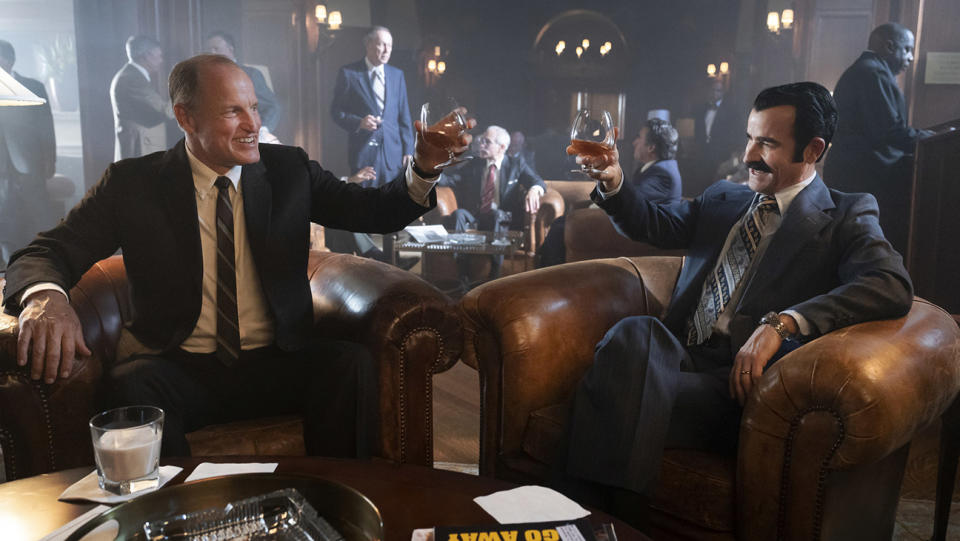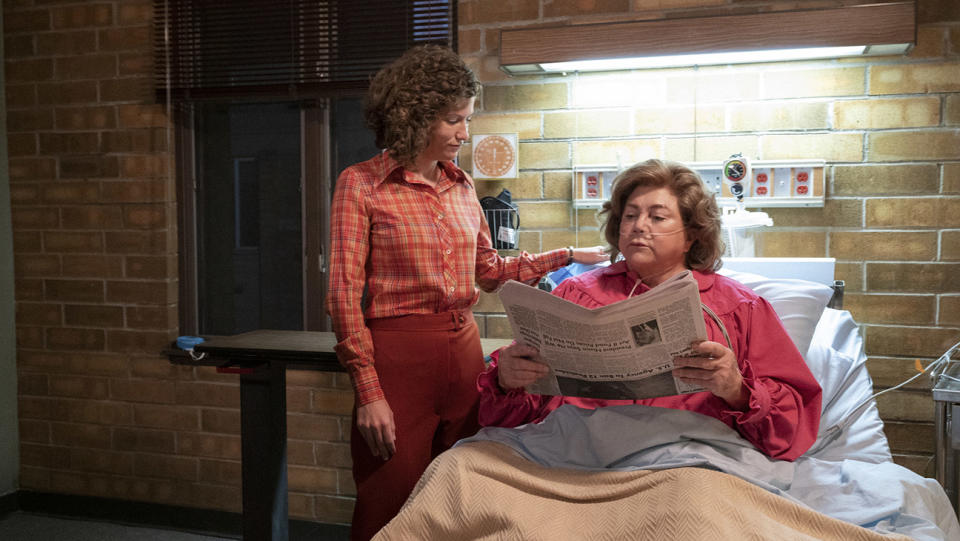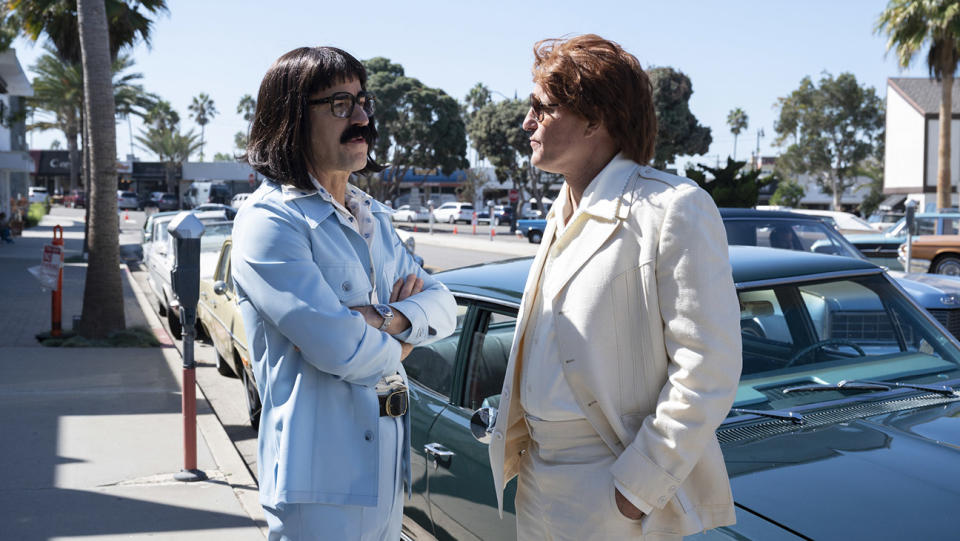How ‘Veep’ Led to ‘White House Plumbers’ and Why Watergate (With a New Spin) Is Ripe for Revisiting
- Oops!Something went wrong.Please try again later.
- Oops!Something went wrong.Please try again later.
- Oops!Something went wrong.Please try again later.
- Oops!Something went wrong.Please try again later.
- Oops!Something went wrong.Please try again later.
- Oops!Something went wrong.Please try again later.
- Oops!Something went wrong.Please try again later.

White House Plumbers shouldn’t require a spoiler warning. The HBO miniseries is about the Watergate scandal. But, since it’s told from the perspective of Nixon’s political saboteurs, E. Howard Hunt (Woody Harrelson) and G. Gordon Liddy (Justin Theroux), the five-episode satirical drama covers a ton of ground that the average person is likely coming upon for the first time.
“There are a lot of people who know Nixon resigned, maybe they’ve heard the word Watergate, maybe they only know ‘gate,’ like they’ve seen this-gate and that-gate. There’s an opportunity here to just let people know what President Nixon did. It’s a story where, maybe it’s been long enough that it’s time to remind people. But now, let’s go one step further,” said David Mandel, who directed all five episodes and is an executive producer alongside the show’s creators and writers, Alex Gregory and Peter Huyck.
More from The Hollywood Reporter
'Succession' Star Alexander Skarsgård on Dropping a "Golden Hand Grenade" Into the Final Season
'Lucky Hank' Made Diedrich Bader Fall in Love With Acting Again
By centering the story around the infamous burglars Hunt and Liddy, former CIA and FBI, respectively, White House Plumbers kicks off in 1971 with the unlikely pair failing upwards and kicking off the series of covert ops that end with them bugging the Democratic National Committee offices at the Watergate complex in one of the most infamous political crimes. And it was the stranger-than-fiction details around the crime that lured Mandel to reunite with Veep writers Gregory and Huyck after wrapping the Emmy-winning political comedy starring Julia Louis-Dreyfus. “Veep was always riffing on things like Nixon and Watergate,” Mandel told The Hollywood Reporter. “I had no choice but to tell this story.”
Harrelson and Theroux were already signed on when Mandel came on board, with Theroux telling THR he wanted Harrelson as his scene partner after meeting the True Detective actor while producing ABC’s Live in Front of a Studio Audience 2019 special featuring Harrelson. “On a wing and a prayer, we got a letter out to Mr. Harrelson and he responded,” said Theroux, speaking alongside his co-star, their self-titled bromance apparent. “To look at it from the lens of the burglars, I just found it fascinating,” added Harrelson.
The pair said they devoured any and all source material available, including video and audio recordings of Liddy as well as autobiographies and books written by Liddy and Hunt. “I was kind of slipping on source material to play with. And then I just had to grow out a mustache,” said Theroux. Harrelson said he was fascinated by what was going on with Hunt’s family, which ultimately includes tragedy. And the series, Mandel said, captures that tragic arc. “Structurally, the burglary itself is right in the middle, in episode three,” said the director (speaking before the May 2 writers strike). “So it’s that journey up, everyone is having fun and a good time and then: the horror, the horror.”
With the remaining episodes set to capture that downward ride, Harrelson and Theroux shared where they land on Hunt and Liddy now. “I found Howard Hunt absolutely reprehensible. I think he’s a terrible human. What he did. Politically, what he was involved in. And also, the way he mishandled his family. I don’t see anything great about him. At the time we were shooting it, of course I loved him, because you have to,” said Harrelson. Theroux, however, thinks Liddy got the ending he wanted: “Even when he gets sentenced to prison, he’s like: This is great, we’re taking a bullet for Nixon. He’s ecstatic. And he then went on to have an amazing radio career and taught self-defense and did the lecture circuit, and appeared on several episode of Miami Vice. I’m stunned by his career. He sort of embraced his infamy, and it ended up paying dividends for him.”
Below, Mandel spoke to THR about how Veep led him to Plumbers, what it was like directing that Hitler scene that helped set the series’ tone and why this moment in history remains relevant as ever in 2023.
So, you left the White House with Veep and then decided to break back in with White House Plumbers. Why did you want to jump into this project next?
It wasn’t planned, let me start there. And maybe if you had asked me, I would have said I’m looking for something else. But the true-life story, the Watergate story, allowed me in some ways to do the thing that on Veep we were sometimes making up our own versions of. We were always on Veep talking about power and the proximity to power and, what would you do to keep the power? And this was the real-world example. Not that Veep was a parody of Watergate, but Veep was always riffing on things like Nixon and Watergate. There are Veep scripts with Selina [Meyer, played by Louis-Dreyfus] in the middle of the night talking to Amy [Anna Chlumsky] about who called her the C-word where in the script it says, “Looking very Nixonian in the middle of the night.” In some ways, I had no choice but to tell this story.
And it was this opportunity to tell the Watergate story as somebody who loves Watergate stories, in a way that no one had ever told it; to dig in on those guys, the burglars, who are in every other version but just for a minute. To tell their story and not just tell the story of Watergate, which is one little part of the five episodes, but the whole story of how it all starts with Daniel Ellsberg and the Pentagon Papers, and how Hunt, this put-out-to-pasture and disgraced guy, and Liddy, this never-was that is desperate to belong, and how they come together. And then of course, what happens to them and what happens to their family. It was too good a story to let someone else tell it.
What was the seed that kicked off your involvement with White House Plumbers?
It’s a funny story. This was something that the two writers, Alex Gregory and Peter Huyck, were actually setting up during the final year of Veep. Every now and then they would go, “We have a meeting, is that OK?” And I would go, “Yeah… what are you working on?” And it was like, “This Plumbers things.” And then when Veep ended, I got invited to go and sit with them for a week and then somehow, I came out of the room as the director of this thing! Ever since I heard they were telling the story from the perspective of the burglars, I was hooked. And then early on, Woody and Justin were attached. So when someone says, “Do you want to be the director?” You answer relatively quickly.

Liddy and Hunt are no longer alive. The title card says, “The following is based on a true story. No names have been changed to protect the innocent, because nearly everyone was found guilty.” What was the research process into telling this story?
It is a true story but, like any true story, you can find discrepancies just in that sort of Rashomon way of how people in the same room will tell it differently. For example, there are four break-in attempts that we talk about in the show. A lot of people never knew there were these other attempts. Well, the different burglars — the Cubans, Hunt, Liddy — some of them don’t consider the ones where they didn’t get upstairs to be an official attempt. So you might have one guy saying there were two attempts, and another guy saying there were three. Even the guys that were there, there’s no agreement to what happened. So the honest answer is, you read everything you can. You find these interviews. You find stuff from when it was going on, you find stuff years later, you find the last interviews they did before they passed away. Because perspectives change, memory changes. You devour everything you can.
And then it’s a two-part process. You obviously can’t tell everything, otherwise it would be a long, boring story. So you chisel away and create the story that’s interesting. The guiding points were always the two guys, the families, the affect on them. Another example: Here’s a meeting and other people were in it; let’s just have two other people there, instead of six. You’re making choices like that. But the things that are happening happened. We’re not trying to rewrite what happened. Occasionally, we don’t know what they said. Maybe both of them weren’t there. So you take liberties to tell a dramatic story. But at least when you’re taking those liberties, you’re taking them in the name of the story you’re trying to tell and who these guys were. I have no doubt there will be somebody going, “That’s not what happened!” But that’s not the exact point of the show.
How stranger than fiction is this series, in terms of what you came across that you can’t believe happened. What were the things that shocked you most?

I like to think of myself as well-read and well-studied on Watergate. Dita Beard, the lobbyist who Kathleen Turner plays, that scandal of taking hotel rooms in exchange for making an antitrust suit. I mean, literally a crime. Like, Nixon should have been impeached for that. Or, at least John Mitchell. I didn’t even know that happened. All of a sudden, you’re like, “Dita Beard, whose that?” And, let’s go one step further: It’s a wild story how they get her out of town and ship her off to a sanitarium kind of place in Denver or wherever she is. Senators went out to Colorado to question her at her bedside and she more or less fakes an angina attack. This happened. And I’m sitting here going, “I cannot believe this happened.” You feel like you struck gold.
How did you go about finding the tone of the show? The Hitler scene from the first episode is a good example — what was it like directing that?
The Hitler scene is kind of a perfect example. This show was always going to be a really funny tragedy. Because, it’s a horrific story. It’s awful. They broke the law, they broke the public’s trust. The president did bad things. Let’s call it what it is. It’s horrible. And then what happens to these guys: they go to prison, they lose their families. That’s also awful. So, we know it’s an awful story. But in this awful story, there’s no denying that Gordon Liddy was a character. Some of it maybe was play acting on his part, like he was trying to be this role that he wanted to be. But, whatever it was, this guy had a penchant for Hitler and Nazis and Hitler’s speeches, and he talks about this in his book. You cannot read his book, Will, without hearing about this. So, this is not hearsay. This is Gordon Liddy telling you himself.
Is there a record of this dinner party exactly that way? Well no, of course not. But how else can we get these people together to talk about Hunt and Liddy kind of having the bromance, to talk about how Hunt’s wife Dorothy [Lena Headey] doesn’t like Liddy from the first moment? And, that carries through. Dramatically, this scene solves a lot of pieces. But ultimately, it is the world’s worst dinner party. You’re going over to this house, you’re having an adult dinner party, you’re slightly talking about government mischief. They aren’t fully saying they’re going to break into the DNC yet, but they know they’re going to do some things. And then Liddy stands up and says, “Hold on a minute, I have something I think you’re going to enjoy,” and then begins to play a Hitler speech. In some ways, that’s this show in a nutshell because it’s so inappropriate, so wrong. And it is funny, but it’s funny because it’s so wrong to laugh at. Nobody wants to laugh at Hitler, but you cannot help yourself. And that is their relationship. Seeing Hunt try to help Liddy like, “Hey, don’t you have any other music?” And Liddy’s obliviousness to it. It is a small little character scene, but it speaks volumes within the story of who these guys were and how all the trouble goes on. There’s something to being on a set and going, “Cue Hitler!”
How many times did you listen to that speech?
To the point where I kind of memorized it a little bit.

The first episode ended in what I would say is the definition of failing upwards; they are being promoted as they unknowingly hand-delivered evidence to the CIA with their “disguised” camera photos (above). How would you say that sets the landscape for the rest of the series?
Failing upwards is the perfect way of talking about it because in some ways, the entire mission was failing upwards. There are so many points where somebody in the administration should have said, “Enough of this.” And also, Hunt knew better. One of the great tragedies of Howard Hunt is that on some level, he knows that this is going to end badly. He’s so desperate to be back that he can’t help it. But, he knows. And so again, it all plays into the tragedy. But we’re setting it up. We’re failing upwards and your reward is ultimately going to be, “Congratulations, you get to break into the Watergate.” It’s not exactly a reward. And that’s our arc. It’s going up to this thing and then the aftermath after.
There are relevant themes at play here for 2023. You started filming this in May 2021. Why did you all want to look back and tell this story now?
Even before what happened in the last couple of years; even before what happened in the last week couple of weeks when a former president of the United States was indicted in a courtroom here in New York [and ultimately found liable for sexual abuse] and a sitting Supreme Court justice is taking $500,000 vacations and not thinking it’s a problem, from a guy, by the way, who may or may not collect Nazi memorabilia.
This feels very much like our old Veep conversations, about how prescient the show was.
I know, this is very much like our old Veep conversations. There’s an opportunity here, first of all, to just let people know what President Nixon did. Let’s start with that and fill in some historical knowledge, number one. It’s a story where, maybe it’s been long enough that it’s time to remind people. But now, let’s go one step further. I think there was a mistake in the United States of America when, after Nixon resigned and Carter was swept into office and all of these new, ethical laws and codes and various things were put into place, thinking that we had solved it all: We fixed politics. We did it. Yay, everything is good again. And again, we don’t know everything that went on but, we can look at things. We can look at Iran-contra, we can look at Clinton. Presidents from both parties abused their power. So here we are now, all of a sudden, in the post-Trump presidency and we’re looking and going, “Oh my God, what these guys did is happening right now.” We can draw a direct line from what’s happening now to back then.
So many people say about Trump, and I think this is wrong, that “Trump changed everything.” No. This was all going on, from Nixon onward. Trump may have moved it more into the open. He may have been more matter-of-fact about it. But we must look at what’s going on today and understand it through the lens of Watergate because these problems never went away and, on some level, and I hate saying this, maybe there is a systematic problem in our form of government, that it’s based a little bit too much on trust that people are going to do the right things. And maybe people can wake up a little bit to the fact that people do bad things. Almost every day as we got closer to the show’s release date, I felt like it’s more relevant and even better timing that we did this thing.
And how much does all of that make you want to return to the world of Veep?
Your favorite question! It’s the same answer: Some day, we will.
Interview edited for length and clarity; these interviews were conducted ahead of the May 2 writers strike. White House Plumbers releases new episodes Monday at 9 p.m. on HBO and Max.
Best of The Hollywood Reporter

